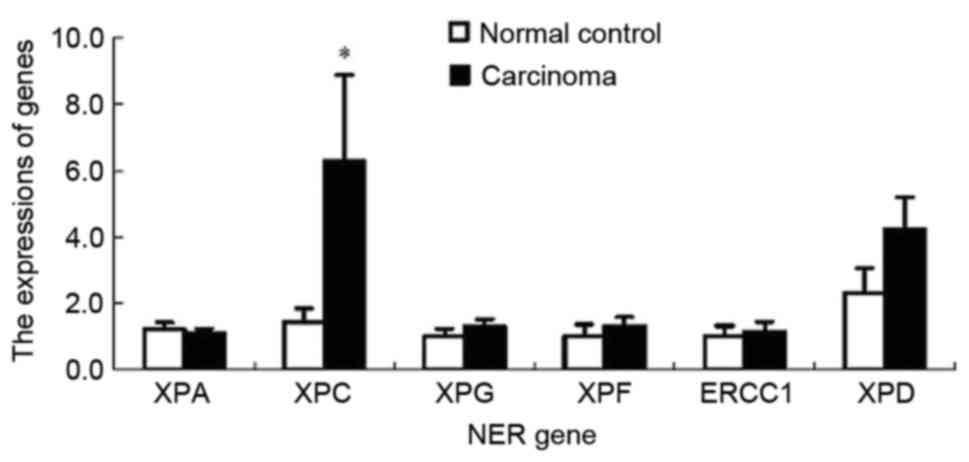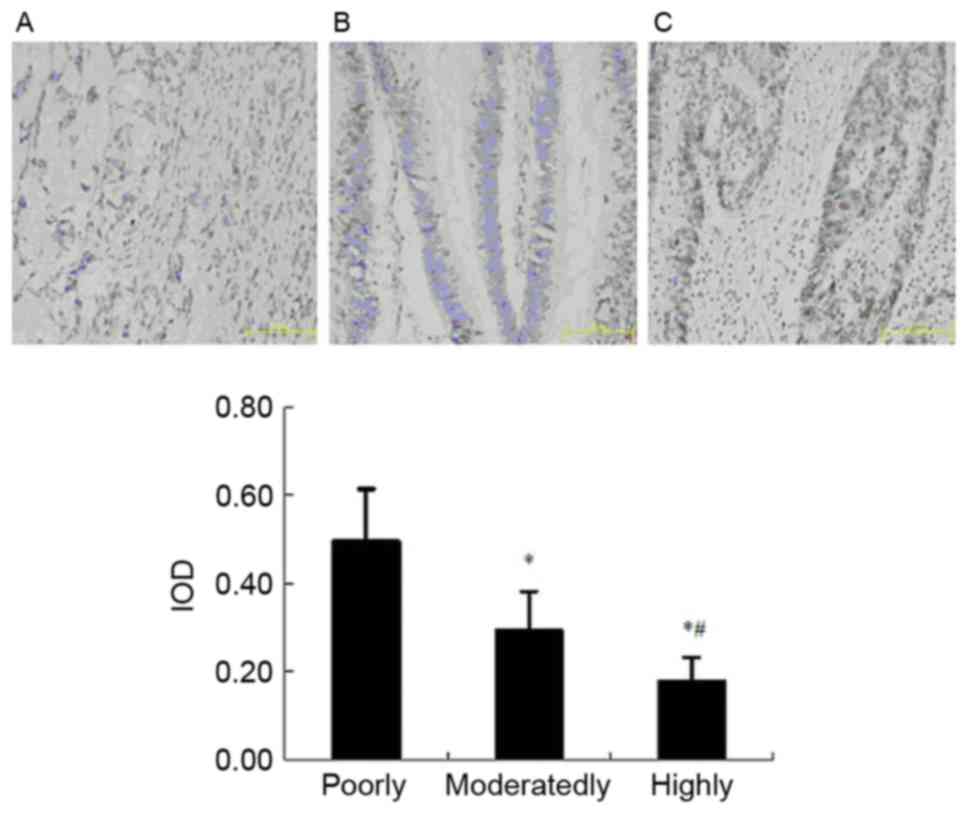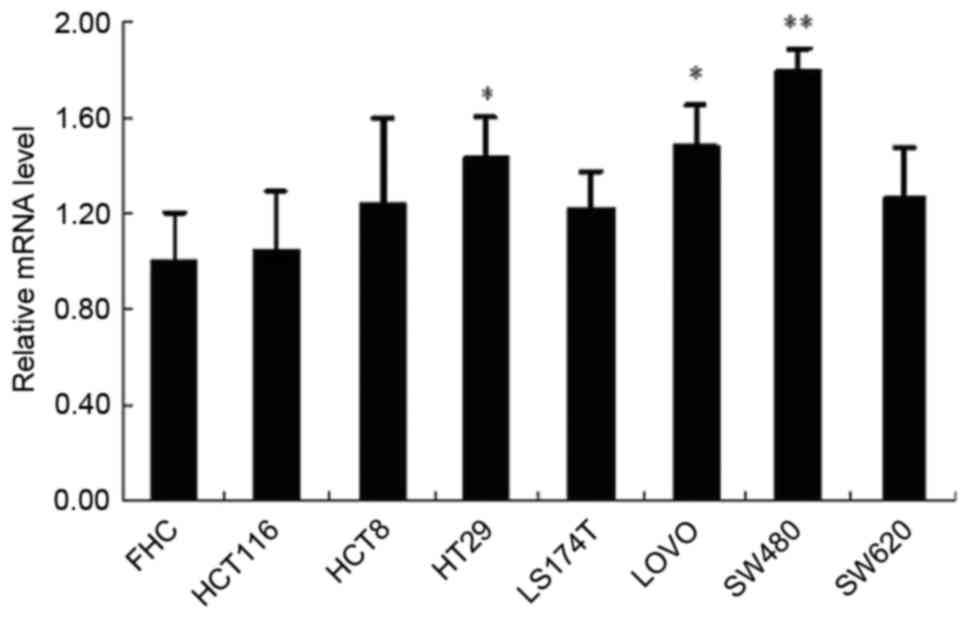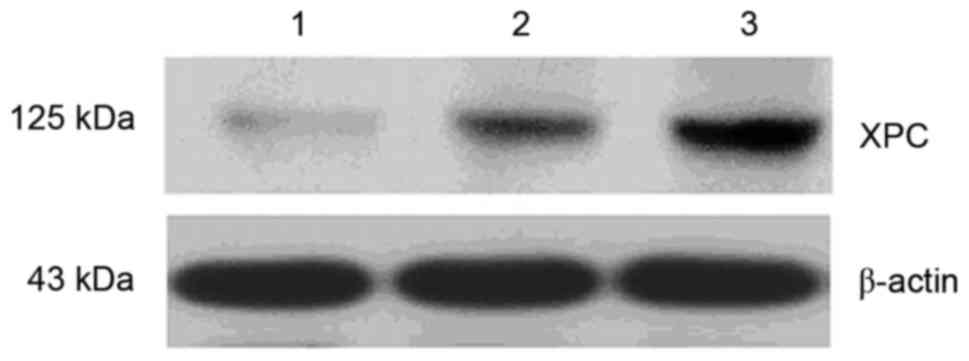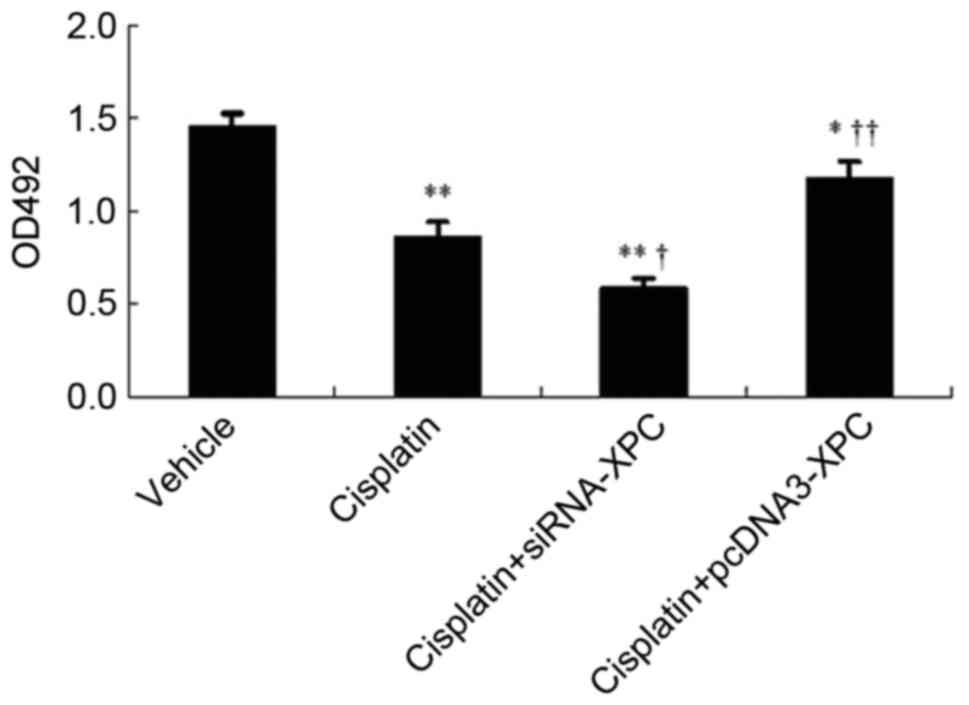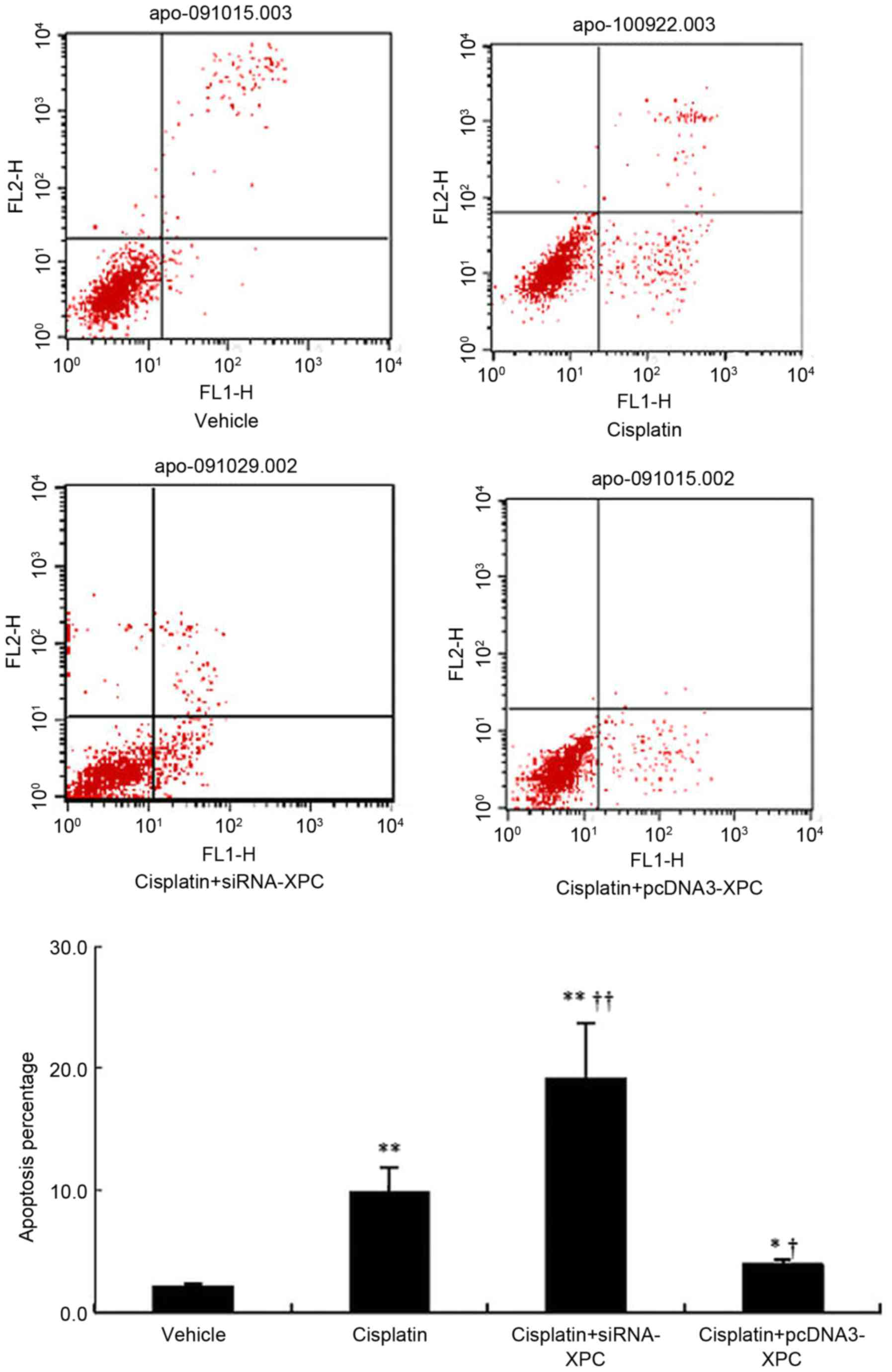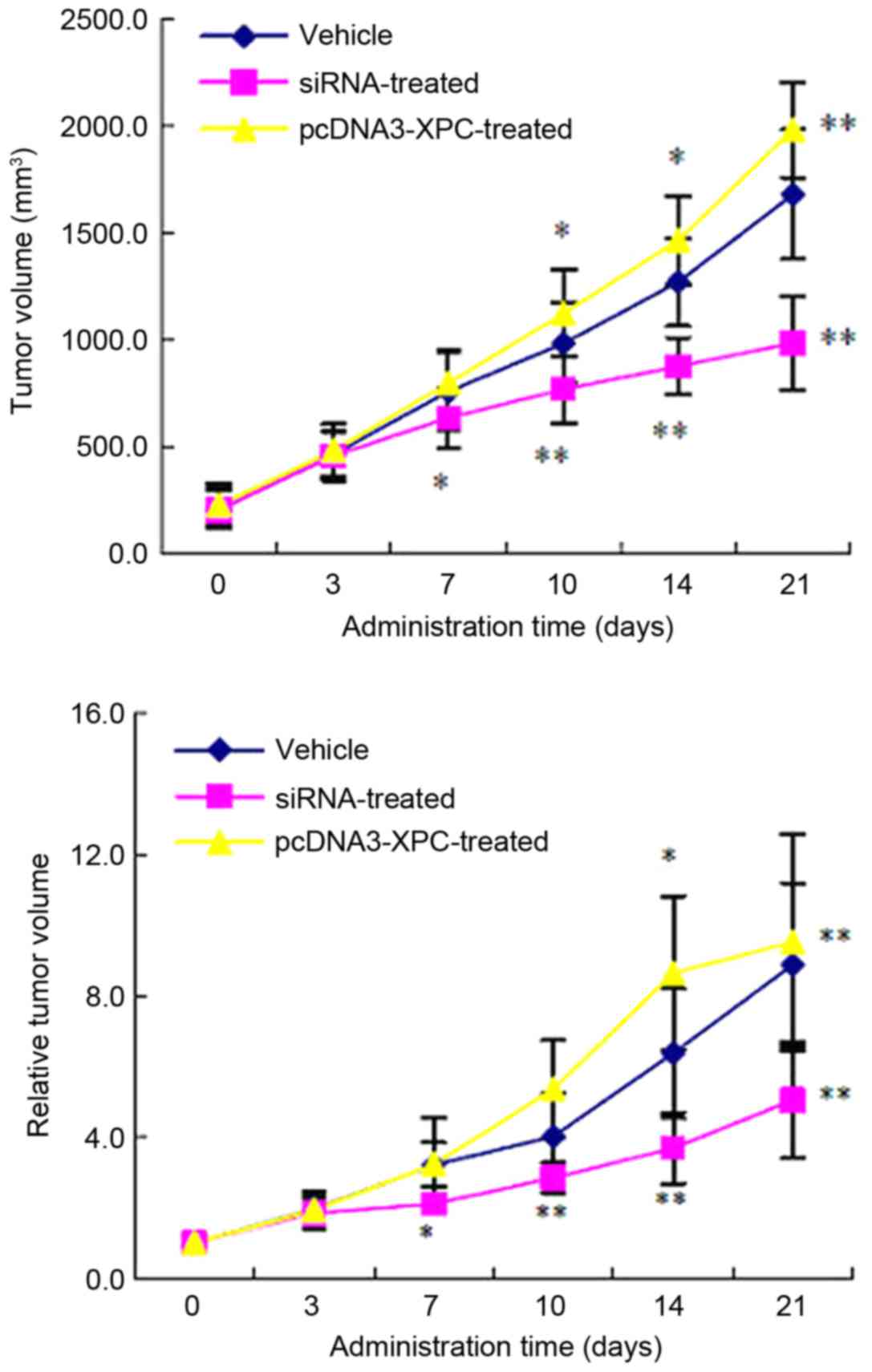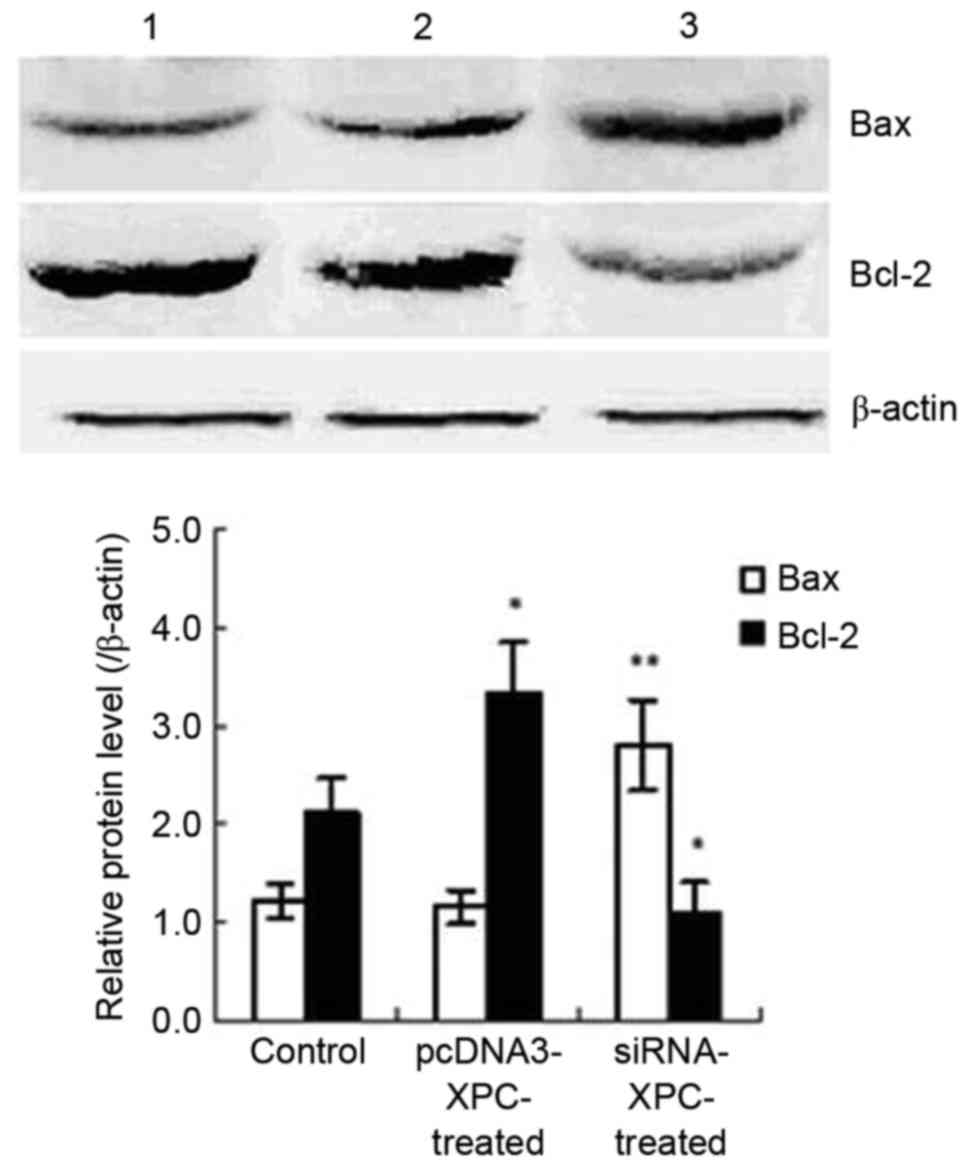|
1
|
Wood RD, Mitchell M, Sgouros J and Lindahl
T: Human DNA Repair Genes. Science. 291:1284–1289. 2001. View Article : Google Scholar : PubMed/NCBI
|
|
2
|
Fuss JO and Cooper PK: DNA repair: Dynamic
defenders against cancer and aging. PLoS Biol. 4:e203. 2006.
View Article : Google Scholar : PubMed/NCBI
|
|
3
|
Iqbal S, Stoehlmacher J and Lenz HJ:
Tailored chemotherapy for colorectal cancer: A new approach to
therapy. Cancer Invest. 22:762–773. 2004. View Article : Google Scholar : PubMed/NCBI
|
|
4
|
Maltseva EA, Rechkunova NI, Gillet LC,
Petruseva IO, Schärer OD and Lavrik OI: Crosslinking of the NER
damage recognition proteins XPC-HR23B, XPA and RPA to photoreactive
probes that mimic DNA damages. Biochim Biophys Acta. 1770:781–789.
2007. View Article : Google Scholar : PubMed/NCBI
|
|
5
|
Fautrel A, Andrieux L, Musso O, Boudjema
K, Guillouzo A and Langouët S: Overexpression of the two nucleotide
excision repair genes ERCC1 and XPC in human hepatocellular
carcinoma. J Hepatol. 43:288–293. 2005. View Article : Google Scholar : PubMed/NCBI
|
|
6
|
Okuda M, Nakazawa Y, Guo C, Ogi T and
Nishimura Y: Common TFIIH recruitment mechanism in global genome
and transcription-coupled repair subpathways. Nucleic Acids Res.
45:13043–13055. 2017. View Article : Google Scholar : PubMed/NCBI
|
|
7
|
Spivak G: Nucleotide excision repair in
humans. DNA Repair (Amst). 36:13–18. 2015. View Article : Google Scholar : PubMed/NCBI
|
|
8
|
Hakem R: DNA-damage repair; the good, the
bad, and the ugly. EMBO J. 27:589–605. 2008. View Article : Google Scholar : PubMed/NCBI
|
|
9
|
Lee SH: Recognition of DNA damage in
mammals. J Biochem Mol Biol. 34:489–495. 2001.
|
|
10
|
Bartels CL and Lambert MW: Domains in the
XPA protein important in its role as a processivity factor. Biochem
Biophys Res Commun. 356:219–225. 2007. View Article : Google Scholar : PubMed/NCBI
|
|
11
|
Köberle B, Roginskaya V and Wood RD: XPA
protein as a limiting factor for nucleotide excision repair and UV
sensitivity in human cells. DNA Repair (Amst). 5:641–648. 2006.
View Article : Google Scholar : PubMed/NCBI
|
|
12
|
Worrillow L, Roman E, Adamson PJ, Kane E,
Allan JM and Lightfoot TJ: Polymorphisms in the nucleotide excision
repair gene ERCC2/XPD and risk of non-Hodgkin lymphoma. Cancer
Epidemiol. 33:257–260. 2009. View Article : Google Scholar : PubMed/NCBI
|
|
13
|
Zafereo ME, Sturgis EM, Liu Z, Wang LE,
Wei Q and Li G: Nucleotide excision repair core gene polymorphisms
and risk of second primary malignancy in patients with index
squamous cell carcinoma of the head and neck. Carcinogenesis.
30:997–1002. 2009. View Article : Google Scholar : PubMed/NCBI
|
|
14
|
Huang WY, Berndt SI, Kang D, Chatterjee N,
Chanock SJ, Yeager M, Welch R, Bresalier RS, Weissfeld JL and Hayes
RB: Nucleotide excision repair gene polymorphisms and risk of
advanced colorectal adenoma: XPC polymorphisms modify
smoking-related risk. Cancer Epidemiol Biomarkers Prev. 15:306–311.
2006. View Article : Google Scholar : PubMed/NCBI
|
|
15
|
Fan W, Zhang HL and Wu XM: Enhancement
effect of nucleotide excision repair gene xeroderma pigmentosun
group an antisense RNA on sensitivity of human lung adenocarcinoma
cell line A549 to cisplatin. Ai Zheng. 24:403–407. 2005.(In
Chinese). PubMed/NCBI
|
|
16
|
Li L, Peterson C and Legerski R: Sequence
of the mouse XPC cDNA and genomic structure of the human XPC gene.
Nucleic Acids Res. 24:1026–1028. 1996. View Article : Google Scholar : PubMed/NCBI
|
|
17
|
Legerski RJ, Liu P, Li L, Peterson CA,
Zhao Y, Leach RJ, Naylor SL and Siciliano MJ: Assignment of
xeroderma pigmentosum group C (XPC) gene to chromosome 3p25.
Genomics. 21:266–269. 1994. View Article : Google Scholar : PubMed/NCBI
|
|
18
|
Livak KJ and Schmittgen TD: Analysis of
relative gene expression data using real-time quantitative PCR and
the 2(-Delta Delta C(T)) methods. Methods. 25:402–408. 2001.
View Article : Google Scholar : PubMed/NCBI
|
|
19
|
Sugai T, Habano W, Uesugi N, Jiao YF,
Nakamura S, Sato K, Chiba T and Ishii M: Molecular validation of
the modified Vienna classification of colorectal tumors. J Mol
Diagn. 4:191–200. 2002. View Article : Google Scholar : PubMed/NCBI
|
|
20
|
Maruyama K, Ochiai A, Akimoto S, Nakamura
S, Baba S, Moriya Y and Hirohashi S: Cytoplasmic beta-catenin
accumulation as a predictor of hematogenous metastasis in human
colorectal cancer. Oncology. 59:302–309. 2000. View Article : Google Scholar : PubMed/NCBI
|
|
21
|
Yang W: Structure and mechanism for DNA
lesion recognition. Cell Res. 18:184–197. 2008. View Article : Google Scholar : PubMed/NCBI
|
|
22
|
Liu SY, Wen CY, Lee YJ and Lee TC: XPC
silencing sensitizes glioma cells to arsenic trioxide via increased
oxidative damage. Toxicol Sci. 116:183–193. 2010. View Article : Google Scholar : PubMed/NCBI
|
|
23
|
Nahari D, McDaniel LD, Task LB, Daniel RL,
Velasco-Miguel S and Friedberg EC: Mutations in Trp53 gene of
UV-irradiated Xpc mutant mice suggest a novel XPC dependent DNA
repair process. DNA Repair. 3:379–386. 2004. View Article : Google Scholar : PubMed/NCBI
|
|
24
|
Chen Z, Yang J, Wang G, Song B, Li J and
Xu LZ: Attenuated expression of xeroderma pigmentosum group C is
associated with critical events in human bladder cancer
carcinogenesis and progression. Cancer Res. 67:4578–4585. 2007.
View Article : Google Scholar : PubMed/NCBI
|
|
25
|
Yang J, Xu Z, Li J, Zhang R, Zhang G, Ji
H, Song B and Chen Z: XPC epigenetic silence coupled with p53
alteration has a significant impact on bladder cancer outcome. J
Urol. 184:336–343. 2010. View Article : Google Scholar : PubMed/NCBI
|
|
26
|
Arora S, Kothandapani A, Tillison K,
Kalman-Maltese V and Patrick SM: Downregulation of XPF-ERCC1
enhances cisplatin efficacy in cancer cells. DNA Repair (Amst).
9:745–753. 2010. View Article : Google Scholar : PubMed/NCBI
|
|
27
|
Chen Z, Xu XS, Yang J and Wang G: Defining
the function of XPC protein in psoralen and cisplatin-mediated DNA
repair and mutagenesis. Carcinogenesis. 24:1111–1121. 2003.
View Article : Google Scholar : PubMed/NCBI
|
|
28
|
Wang G, Chuang L, Zhang X, Colton S,
Dombkowski A, Reiners J, Diakiw A and Xu XS: The initiative role of
XPC protein in cisplatin DNA damaging treatment-mediated cell cycle
regulation. Nucleic Acids Res. 32:2231–2240. 2004. View Article : Google Scholar : PubMed/NCBI
|
|
29
|
De Feraudy S, Ridd K, Richards LM, Kwok
PY, Revet I, Oh D, Feeney L and Cleaver JM: The DNA damage-binding
protein XPC is a frequent target for inactivation in squamous cell
carcinomas. Am J Pathol. 177:555–562. 2010. View Article : Google Scholar : PubMed/NCBI
|
|
30
|
Hanawalt PC, Ford JM and Lloyd DR:
Functional characterization of global genomic DNA repair and its
implications for cancer. Mutat Res. 544:107–114. 2003. View Article : Google Scholar : PubMed/NCBI
|















